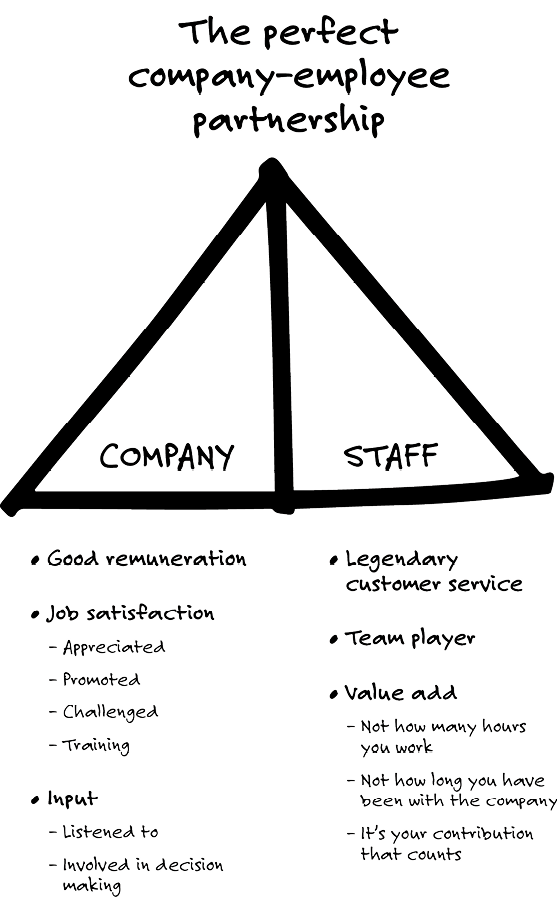
Chapter 11
It’s all about people
So, we now know that everyone is important in a company, no matter what their role. Staff engagement is directly linked to customer satisfaction, profitability and innovation.
Motivated staff put in extra effort, demonstrate their commitment to stay and, importantly, act as the best lead source for new staff referrals. So, one of the most critical roles for a founder is to attract and retain superstars – people who both meet their objectives and share the values of the company. How do we do it?
Remember what I learnt from my first job in Australia. If I didn’t like the fact that I was poorly paid, had no job satisfaction and wasn’t allowed any input into how to fulfil my role, then other people would probably react the same way. When recruiting a team, always consider all three of these key requirements in order to keep staff happy. Remember, it’s not just about attracting, it’s about retaining, too – it’s about continually investing in your number one asset. Never lose sight of that.
I once presented at a not-for-profit, where I was told that my triangle theory was bullshit (wasn’t the first time I’ve been told that …), because they were working without being remunerated. I replied that I didn’t say each of the three requirements for keeping staff happy had to be equally weighted (3/9 for remuneration, 3/9 for satisfaction, 3/9 for input). At different stages of your career, each of those three attributes may carry a different weighting. For a person working for free at a not-for-profit, job satisfaction and adding value are clearly far more important than remuneration. However, the person at the presentation obviously didn’t need to worry about mortgage repayments or paying private school fees. It’s different for everyone, depending on where you are in your life journey – and the ability to recognise that is an important skill for a founder. You have to identify what will get that superstar over the line.
What I do know for sure is that you don’t want your employees saying anything like this:
Your role as a founder is to ensure that your employees are compensated at a market-related salary, love coming to work every day and have a say in what they do. I always say that 99 per cent of the great ideas at Com Tech came from people other than me. Some managers think they just pay for people’s arms, legs and backs – without considering that their brains also come as part of the deal.
So, in return for the company delivering on its commitments, what should you expect from an employee?
Firstly, you want your staff to deliver legendary customer service. I’ve pretty much beaten this topic to death in an earlier chapter, but legendary customer service applies equally to both internal and external customers. There are some people who may never deal with an external customer, but the same rules regarding customer service apply to internal customers – that internal customer is probably relying on some information to support an external customer. A software developer may not be dealing directly with the end customer, but meeting her timeline promptly and reliably will be important to the project manager who is liaising directly with the customer.
Secondly, you only want team players. No one is bigger than the team and the team always comes first. As Reid Hoffman, LinkedIn founder, put it: ‘Life is a team sport, not an individual sport. Once you start thinking that way, everything goes a lot better.’ You don’t want to build a company around brilliant jerks – people who may not be willing to share knowledge or to work well as a team, or who may cause division between different areas of the company.
Finally, you need people who consistently add value. It’s not how long they have been with a company or how many hours they work, it’s only their contribution that counts. Your best Microsoft engineer may have been a star performer when customers were implementing on-premise solutions, but if that superstar didn’t re-engineer their skills to support cloud-based computing then they no longer add value to the company. My former marketing manager, Merle Singer, once told me that her old boss used to say, ‘If you want to know how important you are in a company, punch your hand in a bucket of water – the hole that you leave is the hole that you leave in a company’; i.e., you make no difference. How could I possibly say this when I genuinely believed that in our company, our people were our number one asset? I would often retell Merle’s story, but would say, ‘I want you to think that you are punching your hand in a bucket of putty, so that you would leave an indelible hole if you were to move from one part of the company to another, one region to another – or worse, leave our company’; i.e., you want to make a massive impact in the role in which you are working.
• • •

It’s not just about attracting, it’s about engaging and retaining, too – it’s about continually investing in your number one asset.